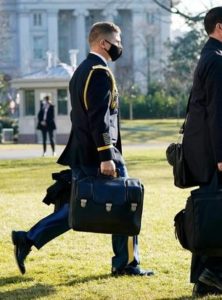Several dozen House Democrats, undoubtedly with Trump in mind, want nuclear war to be a committee decision. (Read story here.)
They argue that “other officials, including the vice president and speaker of the House, should concur with a launch order before it can be issued.” Stephen Young, who advocates on behalf of the Union of Concerned Scientists, says, “No one person should have this ability to kill tens or hundreds of millions [of people]. It is simply too much power.”
The Constitutional argument is that a nuclear launch is an act of war, and only Congress can declare war. The president, as commander-in-chief, manages the war after Congress declares it. But an obvious problem is that in the nuclear age, when enemy missiles can begin impacting military bases, ICBM sites, and cities in less than 20 minutes after detection, there’s simply no time to convene Congress and take a vote.
The existing system vesting launch authority in the president “is built for fast decision-making, not debate” (see article here). That authority isn’t spelled out in law; rather, the Congressional Research Service says, it’s “inherent in his constitutional role as Commander in Chief” (see memo here). Thus, “The President does not need the concurrence of either his military advisors or the U.S. Congress to order the launch of nuclear weapons. In addition, neither the military nor Congress can overrule these orders.”
 What if Congress sought to curb that power, setting up a clash between its explicit constitutional warmaking power and the commander-in-chief’s inherent authority? Then, the Supreme Court would have to decide which branch of government has final say — or whether both do.
What if Congress sought to curb that power, setting up a clash between its explicit constitutional warmaking power and the commander-in-chief’s inherent authority? Then, the Supreme Court would have to decide which branch of government has final say — or whether both do.
But that’s not the only complication. There’s more than one “football”; one accompanies the vice president, too. Who decides whether the president is alive? What if neither is? If I had to make a prediction, I’d say nobody will care who gave the order if the bombs go off.
The ultimate safeguard, of course, is to be careful who you elect to that office.
Photo: The end of the world is in that satchel.
The truth is we don’t know how all the systems will function during an actual attack. There are assumptions being made. The fact is it is unlikely the US will be attacked out of the blue. Now a series of events in the S. China sea could rapidly have the US and China naval forces using a variety of conventional and nuclear weapons. … The issue here is much older than the bomb. The real issues here are as old as the Republic. The founders wanted a strong executive. They did not want an executive that could go make war on another nation. … The President should not go out and make war on other nations without a declaration from Congress but has always been able to use forces to defend. I doubt there will be a sneak nuclear attack on the US, but a series of incidents with escalation that could include nuclear weapons. An aware and active Congress will have had opportunity to weigh in. … The end of the world is not in that satchel. It has already begun. [This comment has been edited.]